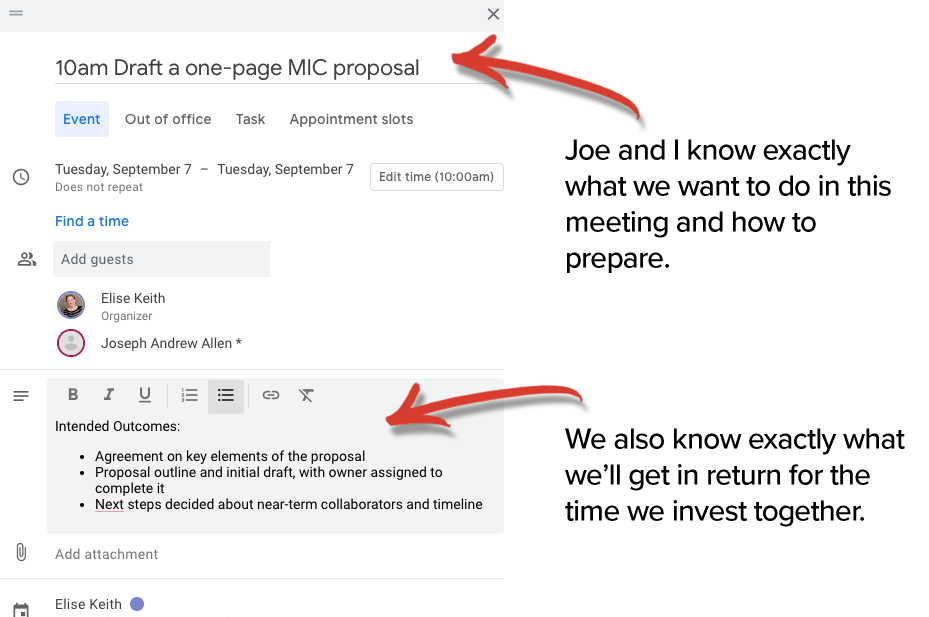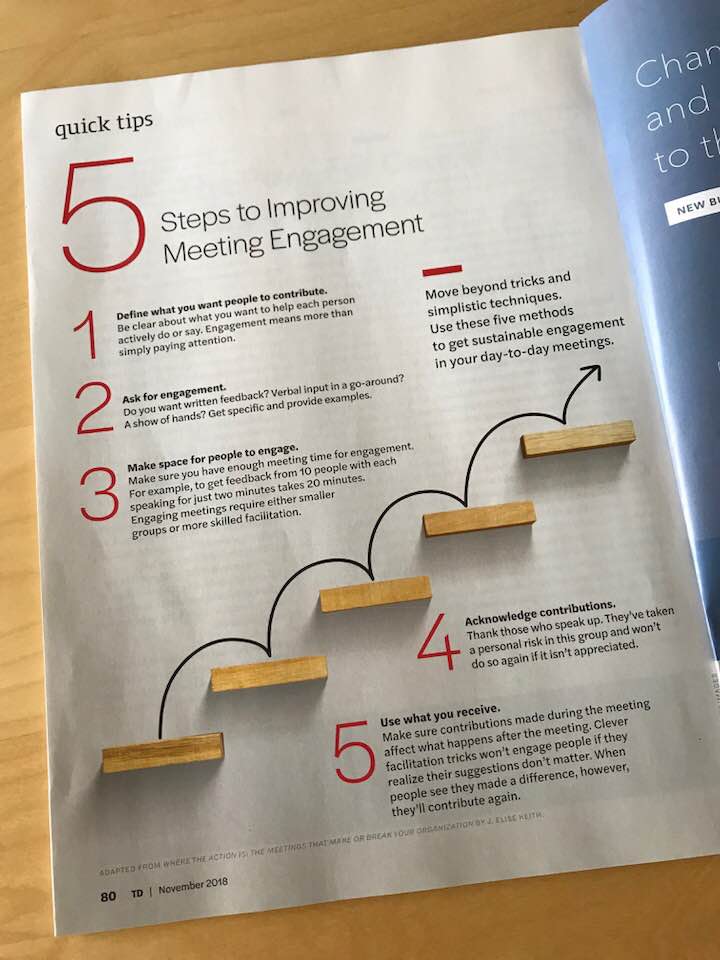Want Better Meetings? Put the Purpose in the Name
You don’t necessarily need an agenda to have a great meeting.
I’m pretty sure you knew that already.
I’m guessing you’ve attended many useful and interesting meetings that lacked an agenda. I bet that when someone tells you “No agenda, no attenda!” you feel chastened, but also a bit annoyed by this demand for what feels like busy work. Short, purposeful meetings simply don’t need an agenda.
Every meeting, though, should have a clear purpose. Why does this group need to spend this time together?
Leaders around the world have a lazy habit of adding meetings to the calendar without making it clear why that meeting needs to happen. As Doodle reported in a 2019 study of over 10 million meetings:
What kinds of meetings are we having? What do we call a meeting?
- US/UK – Meeting
- Spain/France – Réunion
- Germany – Meeting, Sitzung
- Switzerland – Meeting, Sitzung, Réunion, Rinunione
- Brazil – Réuniao
- Italy – Riunione
Congratulations! Now you know how to say the word “meeting” in six Western languages. But you have no idea why those 10+ million meetings were worth the time people spent on them.
You can dramatically improve the likelihood that people will show up prepared and ready to engage when you replace a meaningless name with the meeting’s purpose.
As a reminder, the meeting purpose is typically stated as a verb, and it answers the question “Why does the group need to meet?”
To figure out the purpose of your next meeting, fill in the blank.
We need to meet to _________________.
Examples:
- Decide who to hire
- Review our progress and adjust the schedule
- Brainstorm marketing ideas
- Finalize the plan
Each of those purpose statements serves as a more inspiring, interesting, and informative event name than the same event called a “meeting.”
Using the meeting’s purpose as a name will also give everyone an idea about what type of meeting it is. (And if you can’t figure it out? Cancel the meeting.)
In this Article
Example: A Budget Meeting by Any Other Name is WAY Better
Let’s say you have a meeting on your calendar called “Budget Meeting.”
That only tells people that you’re reserving time to talk about money. No good!
Rename that meeting to clarify the kind of meeting you expect to run and what you need to accomplish.
| Meeting Type | Purpose & New Meeting Name |
|---|---|
| Brainstorming | Identify ways to cut costs |
| Planning | Draft a proposed budget |
| Sensemaking | Review the proposed budget and provide feedback |
| Problem Solving | Figure out what to do about the budget shortfall |
| Decision Making | Decide on a possible budget increase |
Can you see the difference?
When you use the meeting’s purpose as the meeting name:
- People know why that meeting is worth attending.
- They know how to prepare for the meeting.
- You all know what you need to achieve so that the meeting can end.
- Your calendar becomes much more interesting! You can look forward to an interesting discussion and that sense of accomplishment.
These are the critical ingredients for engagement. By clarifying the purpose for your meeting directly in the calendar invite, you remove a lot of the unnecessary anxiety and irritation caused when people have to guess what your meeting is about.
Here’s what that might look like.

How to Spot a Lazy-Habit Meeting Name and Fix It
Any meeting name that includes When (e.g., weekly, daily, monthly), Who (e.g., sales, team, leadership), and What (e.g., meeting, check-in, sync) – but not Why – is a lazy-habit name.
Take a look at your calendar. Do you have a “Weekly Team Meeting” scheduled? If so, there’s a good chance the purpose for that meeting isn’t clear to everyone in the group.
In addition to the words meeting, réunion, etc. listed above, here are other synonyms that may indicate a lazy habit rather than a purposeful meeting name. (Curious about how many boring synonyms your team uses? This Coda tool will show you.)
- Session
- Discuss
- Call
- Get-together
- One on one
- Talk
- Sync
- Collaborate
- Go over
- Connect on
- Follow up
- Check-in
- Piggyback
- Dialogue
- Chat
- Touch Base
Now, I’m not suggesting that you need to ban these words from your calendar entirely. Nor am I saying that you should work extra hard to come up with clever names for all your routine conversations. I’m asking you to think about these words as indicators.
The presence of one or two of these on your calendar isn’t necessarily a problem, just as a few weeds in the garden aren’t a big deal. We review our calendars for these synonyms not to make extra work for ourselves, but because we want to make sure our calendars aren’t overwhelmed by too many of these weedy, energy-draining, poorly defined, and unproductive conversations.
What if the purpose is too long? and Other Questions
I’ve been sharing this technique for creating better meeting names for years. Here are some of the questions people ask.
The purpose of my meeting is too long, too boring, too complex, to use as the meeting name. What should I do?
Find an intriguing short meeting name and use that. Put the meeting’s purpose in the calendar details.
Think of it this way. Your calendar invitation is meeting marketing.
When people look at their calendars, your meeting should stand out as something worthy of their time and focus. You are competing for their attention with the entire noisy universe. “Staff meeting” doesn’t stand a chance.
This opens up another possibility.
Companies that design their meetings to embed their cultural values will usually give their meetings specialized names. The Huddle, the Adrenaline call, the Council, the Braintrust, the Conclave, the Tsunami, the Tiger, the Bullpen, the Dory… you can’t tell from the outside what the purposes for these meetings are, but you can see that they’re special. Then, once you are welcomed into one of these meetings and you learn what it’s all about, you become part of that team. You belong.
If your purpose is clear and your culture strong, name it. Embrace and celebrate the gatherings that make your group special by giving them special names.
I’ve been invited to a “Meeting.” How can I prompt the organizer to do better?
Now you know that you should spend a few minutes clarifying the purpose of all the meetings you schedule, then use that purpose as the name of the meeting. This practice will quickly improve every meeting you run – and highlight a few meetings you ought to cancel!
But what about other people’s meetings?
People working with us to improve their meeting culture often send an email to other meeting organizers asking, “Hey, what’s the purpose of this meeting you invited me to?”
And, as you might imagine, they don’t always get a reply. This email comes out of the blue, catching folks off guard. Some organizers don’t know how to answer the question. Others are busy, so they just ignore the request.
To help out, here’s a sample email template that explains to a meeting organizer why you’re asking about the purpose of their meeting and gives them some hints about how to fill that out.
Obviously, tweak or ignore this as you see fit.
Subject: Purpose and Outcomes for this meeting?
Hi <meeting organizer>,
I’m curious about the purpose and expected outcomes for this meeting, because I don’t see those in the invitation. Can you share more about why we’re meeting and what you hope we might accomplish?
I’m asking because I’m experimenting with science-backed ways to improve our meetings here at <company>, and I’m trying to make sure I know this information in advance for all my meetings so I can come prepared. Sometimes, I also find that I don’t actually have much to contribute. When that happens, I’ll opt out so you can have a more productive conversation with a smaller group.
Thanks so much!
<your name>
P.S. In case this is helpful, this resource includes example purpose and outcome statements for different types of meetings. https://www.lucidmeetings.com/meeting-types
How can I make changes to a standing meeting that our team has been running for years?
First, you can just do it. Any meeting scheduled for the future hasn’t happened yet, which means you have an opportunity to make changes. Send your group a note or bring it up in your next meeting, then make the change.
That said, I realize the underlying question isn’t about how to physically edit a calendar event. This question is about changing your team’s meeting culture. Perhaps you need to do more than rename a few meetings. Perhaps you need to revisit your entire approach to meetings.
If that’s the case, review these articles for some do-it-yourself ideas, or get in touch. We’d love to help your team transform your meeting culture.



